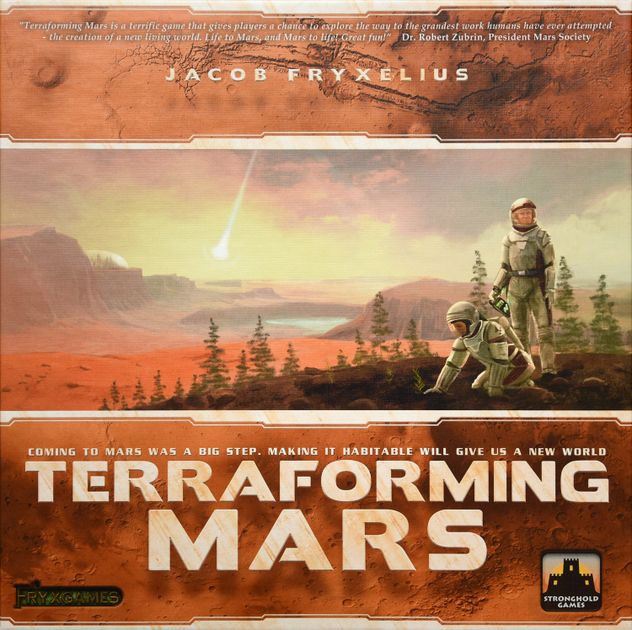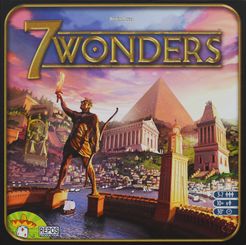Then, was invited to play a game of Magic Maze, which I was skeptical about at first due to the theme, but turned out to be a wonderfully designed co-op party game.
One of the biggest problems with co-op games is "quarterbacking", when one player who is more experienced or more motivated directly or indirectly dictates how other players take their actions. Magic Maze manages to make quarterbacking impossible, while still requiring high levels of coordination and cooperation to succeed.
You are four fantasy characters in a shopping mall (bear with me.) Your objective is for all characters to steal their chosen item (the elf has to steal a bow, the barbarian an axe, etc.) and escape from the mall before time runs out. The map is randomly generated via tile placement as the game goes on - think Zombies. The game is real-time with a sand-timer. Here's the first twist - each player can move every character, but only in one direction! So I might be able to move pawns north, but I need my neighbor to move the pawn east first. (With less than 4 players, sometimes a single player has multiple options.)
Still not so tough, right? Here's the second twist: No talking, gesturing, or communication of any kind! The only comms that are allowed are: 1) Staring intently at someone 2) Putting the "do something" marker in front of a person!
The game is surprisingly difficult, but does occasionally give you spaces which allow you to flip the sand timer and communicate until you take your next action (the sand timer still flowing while you talk, so it's not free, and you need to haul ass quickly.)
It rewards quick thinking, situational awareness, and a balanced team - a weak link will sink the group. A great surprise of a game and another good one to play with gamers and non-gamers alike.
Next up was a demo of Alien Artifacts, a 4X card game that isn't scheduled for release until December.
Unfortunately, we were using photo-copies of game rules and cards, which is fine, except some were clearly from different revisions of the playtest meaning the wording was different, we had no rulebook, and the volunteer demo was overworked, didn't know the rules very well, and did a poor job explaining the rules she did know.
Once we figured it out, the game seemed to be well-designed at its core - it's a fun hybrid of Ascension/Dominion/Resident Evil and Civilization/Twilight Imperium. It does suffer from "competitive solitaire" syndrome, though - there is not a ton of interaction - you can attack other players, but that didn't seem to be advantageous outside of a kingmaking situation.
The group I joined up with was super jovial and we had a great time making fun of the printing errors and the jankiness of the demo setup. Also somehow we got into trading stories about hippos, elephants, and other oddities of Animal Planet documentaries. The game probably would have been fun had we been given a proper demo, but yeah...
I grabbed some dinner, then walked through the tunnel over to Lucas Oil to see what was going on. At the 50-yard line, there was a "mini-museum" set up to commemmorate the 50th GenCon, containing various relics of past conventions.
Here are the original convention programs and maps from the late 1960's and early 1970's - the con was very small and held in Geneva Lake, Wisconsin - hence "GenCon". (I hear that "Geneva Convention" was already taken.)
 |
| The original D&D "Red Box" and "Brown Box" |
 |
| Just casual ~$150,000 in Magic behind a glass case, no biggie (not exaggerating - I priced these out) |
 |
| First edition Axis and Allies (the one with the nukes!) |
At 7:30 I met up with Ben, Dusty, and Alex, a group of guys from Ohio, for a cube draft - I had coordinated a meetup with them on Reddit. They were a great group of guys - each of them in a sweet Mr. Meeseeks hockey jersey.
The amount of effort Ben had put into his cube blew me away - every single card in his cube had custom art, and sweet art at that. Some of the custom art was cheeky - e.g. Brimaz was Mufasa with Simba tokens, Monastery Mentor was Obi-Wan with Luke and Anakin tokens, etc.
He also had a handful of Conspiracy cards sprinkled in, I picked up "Pretty Lucky" which let me go first each match.
As is tradition, I drafted near mono-blue splashing Monastery Mentor and Dragonlord Silumgar. I slowly ground down my B/W midrange opp round 1, but subsequently was crushed by my mono-red opponent round 2. I definitely made a misplay game 2 - should have Force of Will'd my opponent's two-drop Harsh Mentor and it ended up doing probably 10 damage to me via attacking and fetchlands.
Here's a link to Ben's cube, with all of the custom art on display:
http://www.cubetutor.com/visualspoiler/131
After a few rounds of cube, we decided to get in a game of 7 Wonders.
Despite owning the game, I had never had a chance to play it. The game is a hybrid of card drafting, resource management, and empire building - you draft and pass packs of cards just like in MtG, but each card is a building, which either produces a resource, gives you military power, enables cheap trade, or gives you victory points.
The game is very well balanced, and it's not "competitive solitaire" like some empire-building games - you have to pay close attention to what your opponents are doing, as their economic and military developments directly affect your ability to gain victory points, and "hate-drafting" plays a strong role. For example - you get to slap your neighbor around and take victory points from him if you have more military power at the end of each round. Having a monopoly on a certain resource (stone, wood, glass, textiles...) means your neighbors will have to buy the resource from you if they need it - make them rain coins on you!
Plus, the game is quick to setup and play - took us maybe 30-45 minutes for a playthrough, and we were also learning the rules.
 |
| What a typical city looks like after the game is done. |
Was late at this point, so I made the trek home. Tomorrow would bring maybe the best day of gaming yet!
















No comments:
Post a Comment